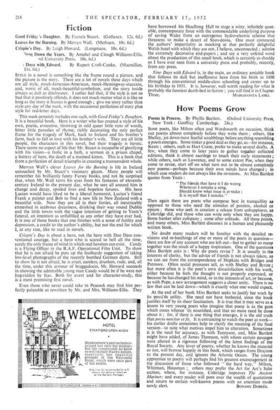How Poems Grow
SomE poets, like Milton often and Wordsworth on occasion, think out poems almost completely before they write them ; others, like Shelley, jot down most fearful scrabblings before anything resembling a poem emerges. Some tinker a good deal as they go, as—for instance, Keats ; others, such as Hart Crane, prefer to make several drafts. A few, when they come in later years to gather together collected editions, think it almost sacrilege to touch their early statements ; while others, such as Lawrence, and to some extent Poe, when they come to revise, start off on what turn out to be almost completely new poems—perhaps because their own minds have changed ; in which case readers do not always like the revisions. As Miss Bartlett quotes from Yeats :
" The friends that have it I do wrong Whenever I remake a song,
Should know what issue is atstake : It is myself that I remake."
Then again there are poets who compose best in tranquillity as opposed to those who need the stimulus of passion, alcohol or opium ; those who seek in creation a release from unhappiness, as Coleridge did, and those who can write only when they are happy. Some hanker after company ; some after solitude. All these points, 'and many others, Miss Bartlett discusses in a human and pleasantly written book.
No doubt many readers will be familiar with the detailed re- visions and re-hatchings of one or more of the poets in question— there are few of any account who are left out—but to gather so many together was the result of a happy inspiration. One of the questions Miss Bartlett asks is : Why do poets revise ? It is usually in the interests of clarity, but the advice of friends is not always taken, as we can see from the correspondence of Hopkins with Bridges and Patmore. Often social pressures tell, as with Shelley and Byron ; but more often it is the poet's own dissatisfaction with his work, either because he feels the thought is not properly expressed, or because he has changed his mind, or in the interests of art, or because, as with Pope, a new arrangement suggests a closer unity. There is no law that can be laid down—which is exactly what one would expect.
At the end of her book Miss Bartlett seeks to justify her work by its possible utility. She need not have bothered, since the book justifies itself by its sheer fascination. It is true that it may serve as a lesson to very young poets who imagine that poesy is as the gum which oozes whence 'tis nourished, and that no more need be done about it ; for, if there is one thing that emerges, it is the old truth that poeta nascitur et fit. It is entrancing to watch the poet at work— his earlier drafts sometimes help to clarify the meaning of the final version—to note what motives impel him to alteration. Sometimes it is the need for accuracy, as with Tennyson, and, Miss Bartlett might have added, of James Thomson, with whom certain passages were altered in a rigorous following of the latest findings of the Royal Society. Any lover of poetry, whether he knows the material or not, will browse happily in this book, which ranges from Drayton to the present day, and ignores the Atlantic Ocean. The young apprentice to poetry will perhaps find his greatest encouragement in the discussion of those who followed " the hard way," Milton, Whitman, Housman ; others may prefer the Art for Art's Sake section, where, for instance, Coleridge improves The Ancient Mariner; and every reader will pore over the wealth of quotations and return to certain well-known poems with an attention made


























 Previous page
Previous page